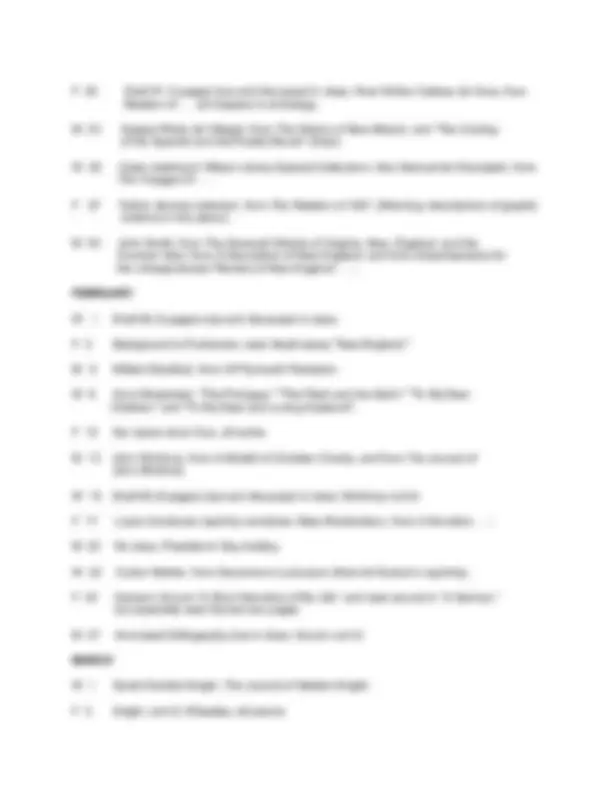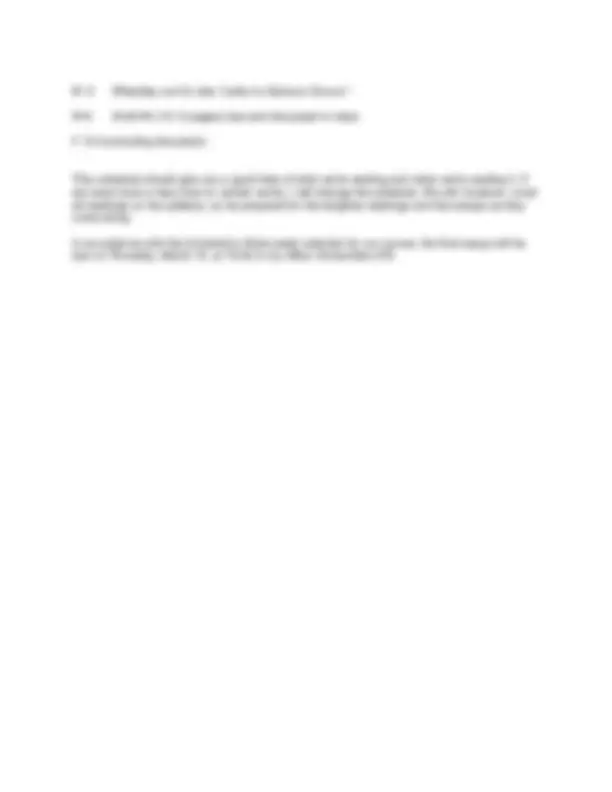




Study with the several resources on Docsity

Earn points by helping other students or get them with a premium plan


Prepare for your exams
Study with the several resources on Docsity

Earn points to download
Earn points by helping other students or get them with a premium plan
Community
Ask the community for help and clear up your study doubts
Discover the best universities in your country according to Docsity users
Free resources
Download our free guides on studying techniques, anxiety management strategies, and thesis advice from Docsity tutors
English 308 is a research and writing intensive course in the context of the literary history of the Early Modern period. The course focuses on writings of exploration, conquest, and European imperialism in colonial contact zones. Students will develop the skills to research and write about literary texts and participate in the critical conversations about them. The course includes a research essay, reading and discussion, and attendance is required. The course is designed for university students.
Typology: Summaries
1 / 4

This page cannot be seen from the preview
Don't miss anything!



English 308 Laura Laffrado Seminar: Early Modern Office: Humanities 379 Texts: The Heath Anthology of American Literature , 7th^ edition (Vol. A) English 308 is a research and writing intensive course in the context of the literary history of the Early Modern period. In this course, students will develop the skills to research and write about literary texts and participate in the critical conversations about them. CONTENT : Using texts from the late fifteenth century through the early eighteenth century, this course focuses on writings of exploration, conquest, and European imperialism in colonial contact zones. We will draw on a wide range of genres such as journals, poems, narratives, sermons, and diaries. We will consider how these various genres challenge our definition(s) of "American" literature(s) and we will examine roles of female discourse, race, religion, and class. We will explore various ways in which America and American identities are defined, wonder about tensions between power and discourse, and attempt to arrive at deeper understandings of influences that shaped American writings during the early modern era. RESEARCH ESSAY: Students will write one twelve-page critical research paper that engages with current scholarship on a text or texts assigned for class. The essay will be revised through multiple drafts and you will receive feedback from your peers on these drafts. Your final version of the essay will be 12 pages, double-spaced. It will include an annotated bibliography as well as all major drafts of your paper discussed in class. We will discuss the research essay at length in class. However, for the moment, please recognize that you will be writing a series of shorter drafts that will ultimately be revised over time to become the final draft of the twelve-page finished product. In addition to our work on drafts of the research essay, class will frequently involve shorter writing assignments in response to the reading. Please be prepared to write five or six shorter essays as the course goes on. In all reading and writing for this class, students should engage in textual analysis, employ textual evidence, and refer to assigned readings. Getting into the practice of implementing contextual material in your reading of literary texts will allow you to compose a successful final paper, and the thinking you do here may also lead you in the direction of a potential topic for your final essay. READING AND DISCUSSION : As students in a five-credit 300-level literature course, you are expected to complete the reading assignments for each class meeting and consider your responses to that reading. Much of the reading will be time-consuming and will require significant focus and concentration. This is not a lecture course. The majority of each class period will be devoted to discussion. Students should come to class prepared to discuss the assigned texts. In order for our conversations to be fruitful, everyone must be reading actively. Please be respectful of others’ thought and opinions, but feel free to disagree with me and with the other students in the class. I expect you to participate regularly and thoughtfully in class discussion. We all have our off days and some material will move some people more than others, but in general I look forward to questions, comments, and answers. ATTENDANCE : Regular mental and physical presence in class is required. (This means that bringing your body here isn't enough; you have to be here and be awake and engaged.) Attendance will be taken at every class meeting. You are limited to a maximum of four absences. If you miss more than four classes, your knowledge, participation, and essay grade
will be affected and your final grade will be dropped one full grade. If you miss more than six classes, you will fail the course. Students are expected to arrive promptly for class and to stay for the full class period. Because arriving late disrupts class, three late arrivals will count as an absence. Please do not schedule appointments or other outside obligations (which would cause you to arrive late for class or to leave early) during the class period. CLASS BEHAVIOR : For a term we will be a classroom community working toward shared goals. We need to respect each other in order to do our jobs well and so good listening and good classroom citizenship are required of you. This means that you turn your phone off when you come into class and that laptops and other personal devices are not allowed. If you have an emergency that requires you to be available by phone, please let me know and then set your phone to vibrate and leave the classroom to answer it. I will of course make exceptions to the rules for students working with the Student disAbility office. (Reasonable accommodation for persons with documented disabilities should be established within the first week of class and arranged through Disability Resources for Students. GRADING POLICY : Your final grade in this course will based on the final essay, revised versions of writing assignments, class participation, and attendance. The attached schedule lists our readings and assignments. We will go over the schedule on the first day of class. Finally, if you find yourself beset by difficult circumstances, if you have trouble with the reading or if you want to check in, do come and see me. I'm always willing to help. Welcome to class. SCHEDULE NOTE: When titles and/or page numbers are not specified for a day's reading, you are to read the entire selection in the Heath. Reading assignments are to be completed by the beginning of the class period assigned for discussion of a given text. JANUARY W 4 Introduction to the course. F 6 Background; read around in "Beginnings to 1700" essay in Heath. M 9 Cluster: Aesthetics and Criticism—Paradigms of Cultural Encounters (all excerpts). W 11 Native American Oral Literatures: Creation/Emergence Accounts (all works); also, Handsome Lake (Seneca), "How America Was Discovered." F 13 Native American Ritual Poetry, Song, and Ceremony (all works). M 16 No class. Martin Luther King, Jr. holiday. W 18 Christopher Columbus, from Journal of the First Voyage to America, 1492- 1493 and from Narrative of the Third Voyage, 1498-1500.
M 6 Wheatley cont’d; also “Letter to Samson Occom.” W 8 Draft #4 (10-12 pages) due and discussed in class. F 10 Concluding discussion. This schedule should give you a good idea of what we're reading and when we're reading it. If we need more or less time on certain works, I will change the schedule. We will, however, cover all readings on the syllabus, so be prepared for the lengthier readings and the essays as they come along. In accordance with the University’s finals week calendar for our course, the final essay will be due on Thursday, March 16, at 10:30 in my office, Humanities 379.